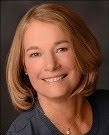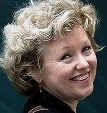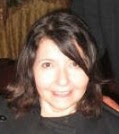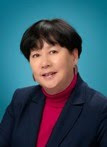
by Karen Kenyon
I believe there are two ways people begin to write-- those who always wrote, were born to write -- and those who have something happen that turns their world upside down, and they have to write about it. I’m the second type. I did always love to express myself though -- but for the first part of my life it was art -- drawing and painting.
But with the birth of our second child my life was turned upside down. I learned to view the world with new eyes, as if an optometrist had clicked the lens changer and my focus shifted. My husband and I, and our four year old son, had looked forward to this new baby, and when she was born with extreme problems -- she was Down Syndrome -- we were shocked, and saddened, and concerned.
So, I started writing a poem to express what I felt about Johanna. I began to see that what looked like her inadequacies were her assets too. Writing the poem, “For Johanna,” helped me see how precious she was. She would not judge others. She would see the beauty of the butterfly without wondering what its Latin name might be. She would not cause wars.
By creating a poem with my feelings and observations of Johanna I came upon awarenesses I might not have had if I had not put pen to paper, I then had a new perspective, for I was not only the mother faced with a new and difficult situation, but I was the one who wrote about it. The careful crafting of my expression (as opposed to journalling) gave me a way of framing the experience, in some sense giving it a name, giving it words to float on. I was encouraged by a therapist to send it out. Though I’d never sent out any writing, and had only written a few poems (and given most away) I took his advice.
Not knowing where to send it, I sent it to Ladies’ Home Journal -- a magazine I happened to have. I had no idea how to submit. I didn’t know about Writer’s Market or following guidelines. But, as it turned out they took my poem, paid me the enormous sum of $35, and published it. Later, a woman I knew at the time, who’d published articles, told me it was a “fluke” -- that if I’d looked at Writer’s Market I would have seen that Ladies’ Home Journal does not take “unsolicited” poetry. Good thing I didn’t know what I was doing!
When Johanna died, suddenly at only six months of age, we were devastated. One morning, a few months later, prompted by people’s well-meaning words, “It’s all for the best” -- I felt the need to cry out -- “But I loved her.”
And I found myself again turning to my new friend and solace -- writing.
So I pulled out the old light blue Smith-Corona typewriter my dad had given me in college. I sat at the kitchen table, and I began to write the story of Johanna. I called it “Johanna Was a Sunshower” -- and I told of the dark and light her life brought, and how much she had taught me.
In a few days I showed it to a neighbor who had done some writing. And she encouraged me to send it out. Again, I had another magazine at home -- Redbook, and at that time Redbook had a “Young Mothers” column. My story seemed to fit that category. So once again, still not knowing the rules, I sent the story.
I didn’t really expect a reply, or imagine they would actually take it. So this all drifted to the back of my mind, until one day -- half a year later, I received a letter from the editor, apologizing for at first losing my manuscript, but then finding it, and loving it. They too wanted to publish my work.
When it came out, I experienced what I now recognize so easily, a major turning point in my life. Something about seeing the story in print, in columns, in an actual magazine! Maybe I could be a writer, I thought.
Anyone who’s suffered a major loss knows that you then look for a new path in life (consciously or unconsciously). And when in a day or two I went to the grocery store and saw on all the current issues of Redbook-- yellow stickers which read “San Diego Mother’s Moving Story” -- I felt a confirming shift. The path seemed clear, and to open.
I signed up at the local university for writing courses (I’d dropped out of college at the University of New Mexico after three years as an Art major once I knew I’d be getting married). I learned about writing from a more professional vantage point, and a new world came into view.
And Johanna’s nursery became my writing room. Where there had been diapers, there were now stacks of clean paper. Where there had been diaper pins, there were pens and pencils.
So, sorrow, loss, and emotional pain led me to writing -- but I continued because writing offers so many directions -- dimensions -- so many new adventures, and so many awarenesses.
Since then I wrote a memoir, Sunshower, published by G. P. Putnam (Richard Marek imprint) abut the tragic death of my young husband, only eight years after Johanna’s death. This book was another lesson in how healing writing can actually be.
But I’ve also written thousands of articles now -- about theatre, food, travel, art, interviews of notable people --in publications which include Newsweek (two “My Turn” columns), British Heritage, The Christian Science Monitor; for 2 1/2 years I covered San Diego stories for the Los Angeles Times. I also wrote a Young Adult biography of the amazing Brontë sisters -- Charlotte, Emily, and Anne. I have two other books in progress -- and always another article coming out. Poetry remains my first love.
Now, after forty years of writing, and 30 of teaching, there are two lessons I’d like to pass on. First -- write from your heart -- and second, don’t be faithful to all the rules! Send your writings where you’d like them to be. You might be surprised!
******Karen Kenyon is the author of Sunshower and The Brontë Family/Passionate Literary Geniuses, and numerous feature stories. She teaches at MiraCosta College in Cardiff, California, and at UCSD Extension in La Jolla, California.. www.miracosta.edu/home/kkenyon
But with the birth of our second child my life was turned upside down. I learned to view the world with new eyes, as if an optometrist had clicked the lens changer and my focus shifted. My husband and I, and our four year old son, had looked forward to this new baby, and when she was born with extreme problems -- she was Down Syndrome -- we were shocked, and saddened, and concerned.
So, I started writing a poem to express what I felt about Johanna. I began to see that what looked like her inadequacies were her assets too. Writing the poem, “For Johanna,” helped me see how precious she was. She would not judge others. She would see the beauty of the butterfly without wondering what its Latin name might be. She would not cause wars.
By creating a poem with my feelings and observations of Johanna I came upon awarenesses I might not have had if I had not put pen to paper, I then had a new perspective, for I was not only the mother faced with a new and difficult situation, but I was the one who wrote about it. The careful crafting of my expression (as opposed to journalling) gave me a way of framing the experience, in some sense giving it a name, giving it words to float on. I was encouraged by a therapist to send it out. Though I’d never sent out any writing, and had only written a few poems (and given most away) I took his advice.
Not knowing where to send it, I sent it to Ladies’ Home Journal -- a magazine I happened to have. I had no idea how to submit. I didn’t know about Writer’s Market or following guidelines. But, as it turned out they took my poem, paid me the enormous sum of $35, and published it. Later, a woman I knew at the time, who’d published articles, told me it was a “fluke” -- that if I’d looked at Writer’s Market I would have seen that Ladies’ Home Journal does not take “unsolicited” poetry. Good thing I didn’t know what I was doing!
When Johanna died, suddenly at only six months of age, we were devastated. One morning, a few months later, prompted by people’s well-meaning words, “It’s all for the best” -- I felt the need to cry out -- “But I loved her.”
And I found myself again turning to my new friend and solace -- writing.
So I pulled out the old light blue Smith-Corona typewriter my dad had given me in college. I sat at the kitchen table, and I began to write the story of Johanna. I called it “Johanna Was a Sunshower” -- and I told of the dark and light her life brought, and how much she had taught me.
In a few days I showed it to a neighbor who had done some writing. And she encouraged me to send it out. Again, I had another magazine at home -- Redbook, and at that time Redbook had a “Young Mothers” column. My story seemed to fit that category. So once again, still not knowing the rules, I sent the story.
I didn’t really expect a reply, or imagine they would actually take it. So this all drifted to the back of my mind, until one day -- half a year later, I received a letter from the editor, apologizing for at first losing my manuscript, but then finding it, and loving it. They too wanted to publish my work.
When it came out, I experienced what I now recognize so easily, a major turning point in my life. Something about seeing the story in print, in columns, in an actual magazine! Maybe I could be a writer, I thought.
Anyone who’s suffered a major loss knows that you then look for a new path in life (consciously or unconsciously). And when in a day or two I went to the grocery store and saw on all the current issues of Redbook-- yellow stickers which read “San Diego Mother’s Moving Story” -- I felt a confirming shift. The path seemed clear, and to open.
I signed up at the local university for writing courses (I’d dropped out of college at the University of New Mexico after three years as an Art major once I knew I’d be getting married). I learned about writing from a more professional vantage point, and a new world came into view.
And Johanna’s nursery became my writing room. Where there had been diapers, there were now stacks of clean paper. Where there had been diaper pins, there were pens and pencils.
So, sorrow, loss, and emotional pain led me to writing -- but I continued because writing offers so many directions -- dimensions -- so many new adventures, and so many awarenesses.
Since then I wrote a memoir, Sunshower, published by G. P. Putnam (Richard Marek imprint) abut the tragic death of my young husband, only eight years after Johanna’s death. This book was another lesson in how healing writing can actually be.
But I’ve also written thousands of articles now -- about theatre, food, travel, art, interviews of notable people --in publications which include Newsweek (two “My Turn” columns), British Heritage, The Christian Science Monitor; for 2 1/2 years I covered San Diego stories for the Los Angeles Times. I also wrote a Young Adult biography of the amazing Brontë sisters -- Charlotte, Emily, and Anne. I have two other books in progress -- and always another article coming out. Poetry remains my first love.
Now, after forty years of writing, and 30 of teaching, there are two lessons I’d like to pass on. First -- write from your heart -- and second, don’t be faithful to all the rules! Send your writings where you’d like them to be. You might be surprised!
******Karen Kenyon is the author of Sunshower and The Brontë Family/Passionate Literary Geniuses, and numerous feature stories. She teaches at MiraCosta College in Cardiff, California, and at UCSD Extension in La Jolla, California.. www.miracosta.edu/home/kkenyon












4 comments:
Very inspiring, Karen! I agree. Pain can be a good motivator to find strength in your life and in your writing, and from that, comes more life. It's worked for me as well.
Cheers,
Caitlin Rother
Karen,
Thanks so much for this beautiful piece. I am so glad we started this blog if for no other reason, to learn more about our varied writing origins, inspirations and accomplishments. I've been in awe of our San Diego Writing Women for many years now, but my appreciation for the highly individual, yet universal, paths we're walking is growing by the week.
Ms. Kenyon --
I appreciate your discussion about your daughter. Perhaps, because I was also born with a birth defect: cerebral palsy, I can sense what you went through. Having gone to special school in my youth [I'm 62 now], I knew many of the social stigma of having a physical and visable disability. I applaud your inner courage and metamorphist into a writer.
Karen,
What an inspirational piece of writing about writing. Your comments about the transformative power of loss rang so true to me, for more reasons than one. It's so important to follow our instincts because sometimes they lead us to our deepest passion. I am eager, now, to read Sunshower. Thanks,
Kathy
Post a Comment